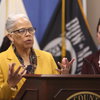As region steps away from reopening, fund offers business grants
The Enterprise — Michael Koff
“They’re using their savings to pay their employees and cover rent,” said Linda MacFarlane, executive director of the Community Loan Fund of the Capital Region. She was speaking of the owners of B. Lodge & Co., a family-owned clothing and department store on North Pearl Street in Albany that had to shut because of coronavirus directives.
ALBANY COUNTY — Of the seven metrics Governor Andrew Cuomo released Monday for businesses in New York’s 10 regions to re-open, Albany County Executive Daniel McCoy said on Tuesday, “We’re meeting four of the seven steps.”
He was referring to these four:
— A 14-day decline in hospital deaths or fewer than five deaths a day for a three-day average;
— New hospitalizations of under 2 per 100,000 residents for a three-day average;
— Share of total beds available with a threshold of 30 percent; and
— Share of intensive-care-unit beds available with a threshold of 30 percent.
Before Tuesday morning’s press briefing, McCoy said, he had talked with Dennis McKenna, president and chief executive officer of Albany Medical Center, about the requirement for a 14-day decline in hospitalizations or fewer than 15 new hospitalizations for a three -day average.
“Albany Med is a regional hospital,” said McCoy, noting that patients come there from out-of-county and even out-of-state. “It’s not going to work if those numbers are counted against us,” said McCoy.
If the far-flung patients aren’t counted, McCoy said, “That will give us five of the seven steps.”
The sixth requirement is to have 30 residents per 1,000 residents tested monthly for COVID-19, which McCoy said “we’re going to meet.”
The seventh requirement is to have at least 30 contact tracers per 100,000 residents. “The last one, no one can meet,” said McCoy.
Albany County has about 306,000 residents and so would need at least 90 tracers. The county’s health commissioner, Elizabeth Whalen, said last week that the county currently has about 30 trackers, mostly health-department employees, and that the department has done contact tracing for more than 20 years for a variety of diseases including pertussis, mumps, measles, and sexually-transmitted diseases.
“It’s a skill set we have,” Whalen said, adding, “We are going to need to increase the workforce … right now, we’re at capacity.” She also said, “I think we’re doing a lot more than many other local health departments.” Added workers may come from other county departments, she said, or by expanding the county’s volunteer medical reserve corps.
On Tuesday, McCoy stressed that a regional approach has to be followed. He named other counties in the Capital Region with which he is working. “I’m confident we can open in a timely manner,” McCoy said, after Governor Andrew Cuomo’s “pause,” which has shut nonessential businesses, ends on May 15.
McCoy said he sent a letter on Tuesday morning to the governor’s office, saying as much.
Asked who would enforce Cuomo’s requirements that businesses, once open, employ social distancing and sanitize, McCoy responded, “That’s the million-dollar question.” He said it might be the police or another county department but it wouldn’t be the county’s health department as it is already overworked, with the “crucial” tasks of testing and mapping and tracing.
Referencing the governor’s office at the capitol, McCoy said, “We’re getting a dialogue going with the second floor.”
Grants for small businesses
Until businesses are able to reopen, the Community Loan Fund of the Capital Region is helping to fill the gap, said the fund’s executive director, Linda MacFarlane.
The COVID-19 Small Business Continuity Program is providing emergency grants to small businesses that have been hurt by the pandemic and economic shutdown. The hope is to raise $3 million to give grants up to $20,000 to businesses in need.
To qualify, the businesses must employ 50 or fewer people and must have experienced at least a 10- to 25-percent decline in revenues due to COVID-19.
“We’re taking donations,” MacFarlane said. Information on making donations and on applying for grants is available on the Community Loan Fund website.
As of Tuesday, 150 businesses had applied, said MacFarlane.
She said that small businesses are “the root of our neighborhoods and of our communities, and I do not know of a single small business that has not been negatively impacted by this COVID-19 crisis.”
The grant program is to help these businesses to survive, to pivot, or to fill the gap until federal funds arrive.
The first round of federal funding did not go well for many small businesses, which typically borrow money though community-development institutions rather than banks. Small businesses are doing “a little better” with the second round of funds in the Paycheck Protection Program, MacFarlane said.
She highlighted a minority business on Orange Street in Albany owned by a seamstress who sewed and embroidered clothes and bags. Once the pandemic struck, the owner pivoted to make masks with replaceable filters.
MacFarlane displayed one of the masks, which she wears, and said the business owner had made over 1,200 masks by herself.
The owner applied for a grant to purchase equipment that will allow her to cut fabric faster and to hire two minority women to help, said MacFarlane.
She gave another example of B. Lodge & Co., a clothing and department store on North Pearl Street. Established in 1867, it’s Albany’s oldest department store and has been owned by the Yonallys since the mid-1990s.
“Mark and Sharon have had to close,” said MacFarlane, because of the regulations to stem the spread of coronavirus. “They’re using their savings to pay their employees and cover rent,” said MacFarlane.
They sell school uniforms and have applied for a grant to purchase inventory so they can begin embroidering names on the uniforms in the hope that schools will be reopening in the fall.
McCoy had started his briefing by encouraging people to “shop local.”
He said of local business owners he has talked to, “They’re scared. They don’t know if they can reopen.”
The big-box stores, he said, “make the profits, the workers don’t. It’s cheaper to go there; I get it.”
But he urged support for “the stores that have been the backbone of our community since the beginning.”
“Go to the local restaurants, go to the stores in your neighborhood,” said McCoy. “Support your people that are your neighbors. That’s how we’re going to get through this.”



